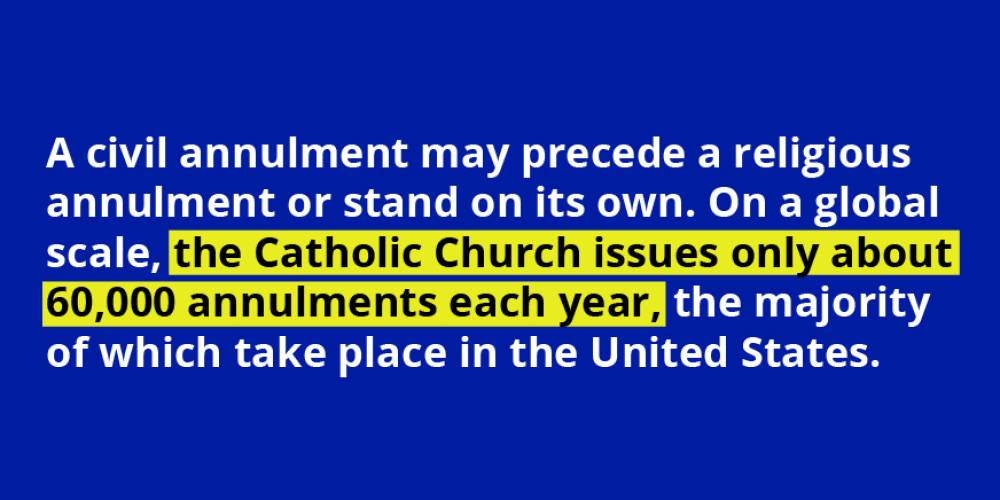What is Needed For an Annulment in Illinois?
 There are two types of annulments - a civil annulment and a religious annulment. A civil annulment, like a divorce, terminates a marriage, but it also invalidates the marriage entirely – as though it never happened. Religious annulment has the same effect, but it is a choice made by those whose religion disallows or disfavors divorce.
There are two types of annulments - a civil annulment and a religious annulment. A civil annulment, like a divorce, terminates a marriage, but it also invalidates the marriage entirely – as though it never happened. Religious annulment has the same effect, but it is a choice made by those whose religion disallows or disfavors divorce.
A civil annulment may precede a religious annulment or stand on its own. On a global scale, the Catholic Church issues only about 60,000 annulments each year, the majority of which take place in the United States. Although only about 6 percent of the world’s Catholics live in America, as of 2015, they accounted for between 55 and 70 percent of all religious annulments.
Civil annulment statistics in Illinois are combined with divorce statistics, making it difficult to know how many occur. The last year the two were reported independently was 2011 when there were 94 annulments in Illinois. In Illinois, an annulment is called a judgment of invalidity. The meaning is the same as an annulment, but the outcome is the same.
Judgment of invalidity requests are rarely granted in the state, as the grounds for the annulment are very specific. Whether a judgment of invalidity is right for you will depend on the facts and circumstances surrounding your marriage. Before you petition a court, it is extremely important that you speak to an experienced St. Charles, IL annulment attorney to discuss your case and help you determine whether you meet the grounds for annulment in the state.
What Are the Grounds for a Judgment of Invalidity?
In the state of Illinois, there are four reasons outlined by the court for invalidating a marriage. These include:
- One spouse was unable to legally agree to the marriage because he or she was under the influence of drugs or alcohol, had an undisclosed mental incapacity, was forced or under duress by the other spouse, or the other spouse engaged in fraud regarding a detail of the marriage.
- Either spouse was unable to engage in sexual intercourse.
- At least one spouse was underage at the time of the marriage and had no parental consent.
- Under Illinois law, the marriage was prohibited. (one spouse was already married, or the parties were too closely related by blood or adoption).
The most common reason for requests for a Judgment of Invalidity is fraud or misrepresentation, meaning that one spouse deceived the other about a significant issue. A spouse may have lied to the other about a prior criminal history, his or her intention to have children, an inability to have children, an inability to engage in sexual relations, or another significant issue. Evidence of some types of fraud can be difficult – or even embarrassing – to present to the court. While a criminal history is documented, the inability to engage in sex must be stated by the spouse seeking the annulment.

Can You Get an Annulment in Illinois?
It is possible to get an annulment – if all the requirements are met – but there can be difficulties involved. Establishing the grounds for an annulment is more difficult than establishing grounds for a divorce. Fault has rarely been an issue for divorce since the advent of no-fault divorce, but in an annulment, fault can have a huge impact on how property is split. Fault can also determine how attorney fees are paid. Since an annulment declares the marriage invalid, spousal support and the division of marital assets are rarely an issue. Both parties must appear in court to be granted an annulment.
How Long Can You Be Married and Still Have the Marriage Annulled?
The reason a person is seeking an annulment will determine the length of time that person has to have the marriage annulled. The time may begin once a spouse finds out something about his or her spouse that falls under the reasons for annulment in the state or from the actual time of the marriage.
In Illinois, after a spouse learns about a situation that qualifies for annulment he or she has 90 days to file for annulment, or one year after the marriage. If both parties are under the age of 18, they have until they turn 18 to file for annulment. If the marriage should not have happened (if one party was already married or the parties are blood relatives), an annulment can be sought at any time.
How Much Does an Illinois Annulment Cost?
The filing fee for having a marriage annulled in Illinois can be anywhere from $100 to $400, depending on the county filed in. Attorney’s fees may be similar to those for a divorce, although in some cases, it can be more difficult to secure an annulment, so it may actually cost more in attorney fees.
How Do You Get an Annulment in Illinois?
Having a marriage invalidated requires the same paperwork as a divorce filing; however, instead of filing a Petition for Dissolution of Marriage, a Petition of Invalidity of Marriage is filed. The petition, stating the grounds for the annulment, is filed with the local circuit court. After one spouse files the petition, the other is served with a copy of the petition.
The spouse who is served has a chance to respond and contest the annulment. Evidence supporting the annulment is presented at a court, and the judge will determine whether the marriage will be invalidated. If the judge agrees the marriage should be invalidated, he or she will sign the Declaration of Invalidity of Marriage, which is then entered into the public record.
Is Divorce a Better Option Than Annulment?
In most cases, the only reason to choose an annulment over a divorce is either for religious reasons or to avoid court-ordered payments, including spousal support. In terms of which is easier, the requirements in a divorce are less strict. Attorneys may advise clients to file for divorce because the filing fees may be less expensive, and a divorce is more likely to be granted.
Contact a DuPage County, IL Annulment Attorney
The decision to have your marriage invalidated is not one that should be taken lightly. You must understand the grounds necessary for an annulment – and be able to prove your allegations. An experienced Batavia, IL annulment lawyer from The Law Office of Matthew M. Williams, P.C. can guide you through the legal process from start to finish. Call 630-409-8184 to discuss your legal options.

 630-409-8184
630-409-8184













